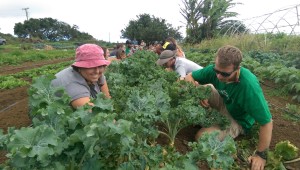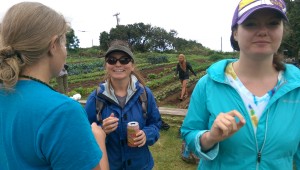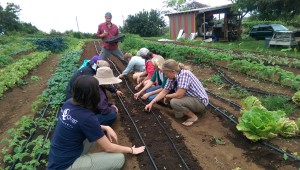
Travis Slagle, M.A.
Horticultural Therapy Director, Pacific Quest
National Geographic recently published the article Gardens: The World’s Oldest Therapist, which describes the scientific inquiry behind nature informed treatment, and how the oldest therapists of the world are poised to become the newest ally in outdoor therapy. No matter how much the urban shuffle distracts us, the idea of “nature as healer” remains an unbreakable truth. The reason for this is that we are not born a blank slate, because the slate itself was designed by nature. Our brain is the product of evolutionary biology; an intergenerational constellation of neural pathways that are pruned and shaped like the branches of an ancient and mysterious tree. At Pacific Quest, the therapeutic work we do is more than creating metaphors about the scenery. We learn to work with nature as if it were a co-therapist.
Recently, PQ clinicians and program supervisors joined me in facilitating a six hour training in horticultural therapy. Over 100 employees attended this experiential retreat at the southernmost organic farm in the US. Therapists and direct care staff worked side-by-side utilizing creative interventions, combining evidence-based practices with mind-body techniques to soothe the senses and regulate the nervous system. Experiential activities were based on neurosequential theory; experimenting with bilateral movement while weeding and planting, tapping a gourd to replicate the resting heart rate, using mindfulness and sensory integration techniques while flipping the compost, weaving banana leaves, and exploring active meditation. The possibilities for creative interventions in the garden are truly endless!
 At Pacific Quest, we are passionate about working in a garden because we believe in the power that it has to regulate the nervous system. The rhythmic patterns, repetition, and somatosensory experience of digging, planting, harvesting, smelling, and tasting what a diverse garden has to offer is healing in itself. Research in horticultural therapy indicates that simple garden activities are compatible with evidence-based practices used to treat a myriad of clinical issues ranging from anxiety and depression, to trauma and stress related disorders. By integrating horticulture with the Neurosequential Model of Therapeutics (NMT), Pacific Quest seeks to honor the wisdom of the world’s oldest therapists with the most current research in neurodevelopment.
At Pacific Quest, we are passionate about working in a garden because we believe in the power that it has to regulate the nervous system. The rhythmic patterns, repetition, and somatosensory experience of digging, planting, harvesting, smelling, and tasting what a diverse garden has to offer is healing in itself. Research in horticultural therapy indicates that simple garden activities are compatible with evidence-based practices used to treat a myriad of clinical issues ranging from anxiety and depression, to trauma and stress related disorders. By integrating horticulture with the Neurosequential Model of Therapeutics (NMT), Pacific Quest seeks to honor the wisdom of the world’s oldest therapists with the most current research in neurodevelopment.
 For the adolescents and young adults that we work with, the simple task of growing a garden becomes a parallel process of the growth in oneself. Whether we are treating the emotional wounds of childhood, or the injured leaves of a common houseplant; the key factors of empathy, relatedness, and unconditional positive regard are still the same. Nature teaches us that everything that lives is biologically designed to grow and adapt. The same is true for the families and young people with whom we work. By actively experimenting with the process of growth and adaptation in nature, we become more aware of who we are and what we want to be. This is what PQ is all about; believing in the world’s oldest therapist, and re-learning the wisdom of the past in order to create a more sustainable future, one person and one garden at a time.
For the adolescents and young adults that we work with, the simple task of growing a garden becomes a parallel process of the growth in oneself. Whether we are treating the emotional wounds of childhood, or the injured leaves of a common houseplant; the key factors of empathy, relatedness, and unconditional positive regard are still the same. Nature teaches us that everything that lives is biologically designed to grow and adapt. The same is true for the families and young people with whom we work. By actively experimenting with the process of growth and adaptation in nature, we become more aware of who we are and what we want to be. This is what PQ is all about; believing in the world’s oldest therapist, and re-learning the wisdom of the past in order to create a more sustainable future, one person and one garden at a time.
The World’s Oldest Therapist
Travis Slagle, M.A. Horticultural Therapy Director, Pacific Quest National Geographic recently published the article Gardens: The World’s Oldest Therapist, which describes the scientific inquiry behind nature informed treatment, and how the oldest therapists of the world are poised to become the newest ally in outdoor therapy. No matter how much the urban shuffle distracts us, …
Travis Slagle, M.A.
Horticultural Therapy Director, Pacific Quest
National Geographic recently published the article Gardens: The World’s Oldest Therapist, which describes the scientific inquiry behind nature informed treatment, and how the oldest therapists of the world are poised to become the newest ally in outdoor therapy. No matter how much the urban shuffle distracts us, the idea of “nature as healer” remains an unbreakable truth. The reason for this is that we are not born a blank slate, because the slate itself was designed by nature. Our brain is the product of evolutionary biology; an intergenerational constellation of neural pathways that are pruned and shaped like the branches of an ancient and mysterious tree. At Pacific Quest, the therapeutic work we do is more than creating metaphors about the scenery. We learn to work with nature as if it were a co-therapist.
Recently, PQ clinicians and program supervisors joined me in facilitating a six hour training in horticultural therapy. Over 100 employees attended this experiential retreat at the southernmost organic farm in the US. Therapists and direct care staff worked side-by-side utilizing creative interventions, combining evidence-based practices with mind-body techniques to soothe the senses and regulate the nervous system. Experiential activities were based on neurosequential theory; experimenting with bilateral movement while weeding and planting, tapping a gourd to replicate the resting heart rate, using mindfulness and sensory integration techniques while flipping the compost, weaving banana leaves, and exploring active meditation. The possibilities for creative interventions in the garden are truly endless!
Questions? Call or Text our Admissions Team: 808-937-5806